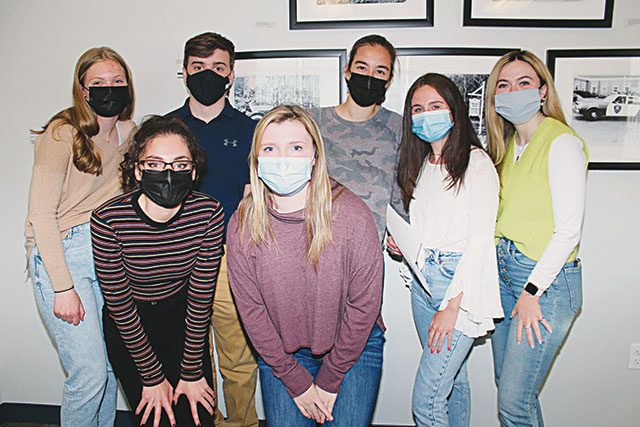Published May 19, 2021
Greene said the focus groups were voluntary and confidential, and the student participants’ parents were required to sign off on allowing their children to participate in them.
“Our 20 Youth Council members have looked extensively at these reports and feel it is an accurate representation of what they see in Lynnfield,” said Greene.
Greene said the surveys identified protective factors A Healthy Lynnfield “would like to grow” in addition to risk factors the substance abuse coalition “would like to shrink.”

Senior Sarah Doherty said the focus groups outlined a number of positive benefits of living in Lynnfield. She said students enjoy being involved in a variety of activities in town that are not just sports-related. She also said students reported feeling “supported by the school system.”
“Another great benefit of living in Lynnfield is it is a tight-knit community that is welcoming and supportive,” said Doherty.
Doherty also noted students reported feeing supported by “positive adult role models” such as coaches and mentors.
Senior Maddie Cook gave an overview about how students believe living in Lynnfield can be challenging.
“Some people feel like they are living in a bubble, which creates the possibility of a lack of exposure and opportunities for diverse experiences,” said Cook. “A lack of diversity or opportunities for experience can create barriers. Working on opportunities to expand our knowledge and experience outside of Lynnfield will give us a better and more realistic perspective.”
Cook also noted that students reported feeling pressure to succeed academically and with extra curricular activities.
“While pressure and expectations can be a motivator for success, it can also increase stress and can negatively impact mental health,” said Cook. “Working on increasing communication with teachers to create a better school and life balance as well as a continued focus on learning about self-care will help coping strategies and improve mental health.”
Cook also said students reported feeling like they don’t know where to go in order to get help or where to get their friends help.
“Although we know those resources are out there, we need to creatively find a way to get those resources into the hands of people who need them,” said Cook.
Senior Drew von Jacko said the survey’s participants reported that the high school’s workload has negatively impacted students’ mental health.
“Students are trying to get everything done,” said von Jacko. “I feel that the teachers don’t understand kids are working on their schoolwork well into the night.”
Von Jacko also noted that the focus groups reported that screen time has impacted students’ sleep schedules because students often want to talk with their friends or watch TV after finishing homework.
“The overwhelming workload is bogging down kids and they don’t have time to talk to their friends,” said von Jacko.
Senior Riley Slaney said the focus groups revealed that Adderall, alcohol, nicotine and marijuana are the most common substances used by Lynnfield High students.
“Substance use has changed over the years,” said Slaney. “When I entered high school four years ago, vaping nicotine and marijuana was not being used among my peers.”
Freshman Olivia Scire agreed.
“There have been seventh-graders hiding electronic cigarettes in their backpacks,” said Scire. “As I entered high school, I noticed that substance use was a huge issue along with a decrease in health education. We must continue to educate students on all harmful substances at both the middle school and the high school.”
Slaney noted that peer pressure often results in students engaging in substance use.
Scire said the focus groups reported that students often abuse alcohol and drugs as a way to cope with stress.
“Students are looking for a relief,” said Scire. “There is more use among friend groups rather than single use. We can see this in open spaces such as parking lots, school bathrooms, parties, and even in parents’ homes if they are allowing it or don’t know that it is happening.”
Slaney said there are parents in town who allow their children to drink alcohol. She also said there are students who take alcohol from home, and their parents “don’t say anything when they know it is missing.”
Scire said it’s important for parents to discuss the dangers of substance use with their children.
“Through Snapchat, we can see students sharing what substances they have, how much they have and if they are selling it,” said Scire. “This information needs to be in parents’ hands.”
Slaney said increasing parental support and supervision will decrease substance use at home. She also said social-emotional education can help students learn to say no to substance use. She said it’s important for students to have role models who teach them “how to do the right thing.”
Freshman Addie Connelly concurred with Slaney’s viewpoint.
“Parental influence about substance use is very strong,” said Connelly. “Knowing where their parents stand on under age substance use really influences a child’s decision.”
While sophomore Evyenia Georges said LHS has mental health support resources, she said students suggested that the high school launch check-ins where educators can ask students about their mental health. She also said the high school should expand its health education curriculum.
“Kids only receive a semester of health education that is all nutrition,” said Georges. “There is no further education of health in high school.”
Georges also said it is important for upperclassmen to set a positive example for underclassmen.
“The upperclassmen have a huge influence on underclassmen,” said Georges.
Slaney thanked the School Committee for inviting the council to the meeting.
“It is very important to us that you care about what we say,” said Slaney.
SC praises council
School Committee Chairman Rich Sjoberg praised the Youth Council’s work over the course of the academic year, which he noted began last November.
“I am so impressed with everything that I heard,” said Sjoberg. “One of the things that we are most proud of is we listen to our students, and you have been an extremely strong voice. You have given us a pathway of work that we will add to the things we already do. Everything you do is very important.”
School Committee Vice Chairwoman Stacy Dahlstedt, who is the committee’s representative on A Healthy Lynnfield, said the Youth Council has done a “phenomenal” job this year.
“I am so impressed with how you are communicating the positive influences as well as the areas we need to focus on more,” said Dahlstedt.
Dahlstedt suggested that school officials “take a closer look” at the high school’s health curriculum.
“I have a middle schooler and I know there is a lot of great education that happens there, but we can’t help students learn and grow if it just stops,” said Dahlstedt.
School Committee member Jamie Hayman noted that overcoming the mental health stigma is a challenge that needs to be overcome.
“You guys have great ideas,” said Hayman. “If you have ideas, send them to us and we will keep them anonymous. We want to here from you. We want kids to know it’s okay to ask for help.”
School Committee member Phil McQueen said he would like to learn more about how homework can be “evened out” in order to alleviate students’ stress.
School Committee member Kate DePrizio commended the Youth Council for giving an excellent presentation to the board.
“Your voices are so much more powerful than you know,” said DePrizio. “It’s a ripple effect. Someone is going to hear what you said, and it’s going to touch their heart in different ways. Your voices can lead the way to change.”




